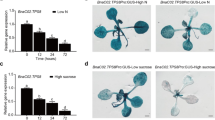Abstract
The Arabidopsis thaliana etr1-1 allele, capable of conferring ethylene insensitivity in a heterologous host, was introduced into transgenic carnation plants. This gene was expressed under control of either its own promoter, the constitutive CaMV 35S promoter or the flower-specific petunia FBP1 promoter. In about half of the transgenic plants obtained flower senescence was delayed by at least 6 days relative to control flowers, with a maximum delay of 16 days, a 3-fold increase in vase life. These flowers did not show the petal inrolling phenotype typical of ethylene-dependent carnation flower senescence. Instead, petals remained firm and finally started to rot and decolorize.
In transgenic plants with delayed flower senescence, expression of the Arabidopsis etr1-1 gene was detectable and the expression pattern followed the activity of the upstream promoter. In these flowers expression of the ACO1 gene, encoding the final enzyme in the ethylene biosynthesis pathway, ACC oxidase, was down-regulated. This indicates that the autocatalytic induction of ethylene biosynthesis, required to initiate and regulate the flower senescence process, is absent in etr1-1 transgenic plants due to dominant ethylene insensitivity.
The delay in senescence observed in transgenic etr1-1 flowers was longer than in flowers pretreated with chemicals that inhibit either ethylene biosynthesis (amino-oxyacetic acid) or the ethylene response (silver thiosulfate). This may have important implications for post-harvest management of carnation flowers.
Similar content being viewed by others
References
van Altvorst AC, Bovy AG: The role of ethylene in the senescence of carnation flowers, a review. Plant Growth Regul 16: 43–53 (1995).
van Altvorst AC, Riksen T, Koehorst H, Dons HJM: Transgenic carnations obtained by Agrobacterium tumefaciensmediated transformation of leaf explants. Transgen Res 4: 105–113 (1995).
Angenent GC, Busscher M, Franken J, Mol JNM, van Tunen AJ: Differential expression of two MADS box genes in wildtype and mutant petunia flowers. Plant Cell 4: 983–993 (1992).
Angenent GC, Franken J, Busscher M, Colombo L, van Tunen AJ: Petal and stamen formation in petunia is regulated by the homeotic gene fbp1. Plant J 4: 101–112 (1993).
Ayub R, Guis M, Ben Amor M, Gillot L, Roustan JP, Latche A, Bouzayen M, Pech JC: Expression of ACC oxidase antisense gene inhibits ripening of cantaloupe melon fruits. Nature Biotechnol 14: 862–866 (1996).
Borochov A, Woodson WR: Physiology and biochemistry of flower petal senescence. Hort Rev 11: 15–43 (1989).
Bovy A, van den Berg C, de Vrieze GD, Thompson WF, Weisbeek P, Smeekens S: Light-regulated expression of the Arabidopsis thaliana ferredoxin gene requires sequences upstream and downstream of the transcription initiation site. Plant Mol Biol 27: 27–39 (1995).
Chang C, Kwok SF, Bleecker AB, Meyerowitz EM: Arabidopsis ethylene-response gene ETR1: similarity of product to two-component regulators. Science 262: 539–544 (1993).
Ecker JR: The ethylene signal transduction pathway in plants. Science 268: 667–675 (1995).
Fluhr R, Mattoo AK: Ethylene: biosynthesis and perception. Crit Rev Plant Sci 15: 479–523 (1996).
Good X, Kellogg JA, Wagoner W, Langhoff D, Matsumura W, Bestwick RK: Reduced ethylene synthesis by transgenic tomatoes expressing S-adenosylmethionine hydrolase. Plant Mol Biol 26: 781–790 (1994).
Hamilton AJ, Lycett GW, Grierson D: Antisense gene that inhibits synthesis of the hormone ethylene in transgenic plants. Nature 346: 284–287 (1990).
Klee HJ, Hayford MB, Kretzmer KA, Barry GF, Kishore GM: Control of ethylene synthesis by expression of a bacterial enzyme in transgenic tomato plants. Plant Cell 3: 1187–1193 (1991).
Knoester M, van Loon LC, van den Heuvel J, Hennig J, Bol JF, Linthorst HJM: Ethylene-insensitive tobacco lacks nonhost resistance against soil-borne fungi. Proc Nat Acad Sci USA 95: 1933–1937 (1998).
Oeller PW, Lu MW, Taylor LP, Pike DA, Thoelogis A: Reversible inhibition of tomato fruit senescence by antisense RNA. Science 254: 437–439 (1991).
Sambrook J, Fritsch EF, Maniatis T: Molecular Cloning: A Laboratory Manual, 2nd ed. Cold Spring Harbor Laboratory Press, Cold Spring Harbor, NY (1989).
Savin KW, Baudinette SC, Graham MW, Michael MZ, Nugent GD, Lu CY, Chandler SF, Cornish EC: Antisense ACC oxidase RNA delays carnation petal senescence. HortScience 30: 970–972 (1995).
Schaller GE, Bleecker AB: Ethylene-binding sites generated in yeast expressing the Arabidopsis ETR1 gene. Science 270: 1809–1811 (1995).
Smalle J, van der Straeten D: Ethylene and vegetative development. Physiol Plant 100: 593–605 (1997).
Wilkinson JQ, Lanahan MB, Clark DG, Bleecker AB, Chang C, Meyerowitz EM, Klee HJ: A dominant mutant receptor from Arabidopsis confers ethylene insensitivity in heterologous plants. Nature Biotechnol 15: 444–447 (1997).
Woodson WR, Lawton KA: Ethylene-induced gene expression in carnation petals. Relationship to autocatalytic ethylene production and senescence. Plant Physiol 87: 498–503 (1988).
Author information
Authors and Affiliations
Rights and permissions
About this article
Cite this article
Bovy, A.G., Angenent, G.C., Dons, H.J. et al. Heterologous expression of the Arabidopsis etr1-1 allele inhibits the senescence of carnation flowers. Molecular Breeding 5, 301–308 (1999). https://doi.org/10.1023/A:1009617804359
Issue Date:
DOI: https://doi.org/10.1023/A:1009617804359




